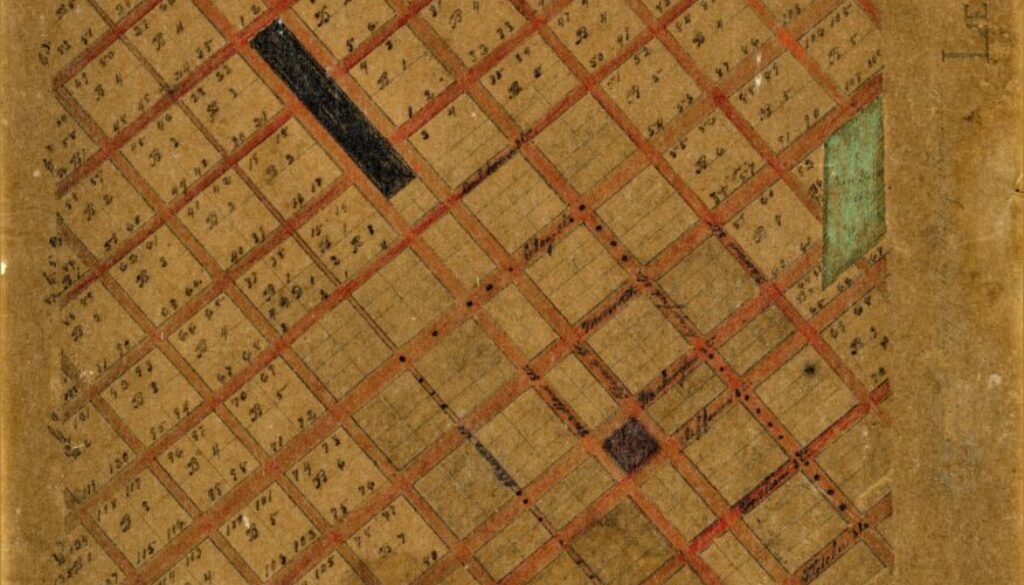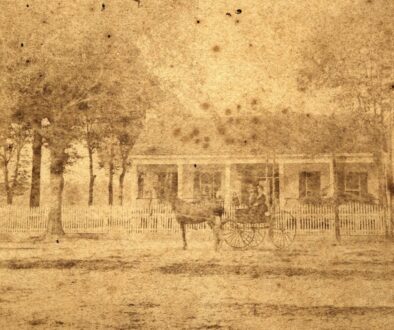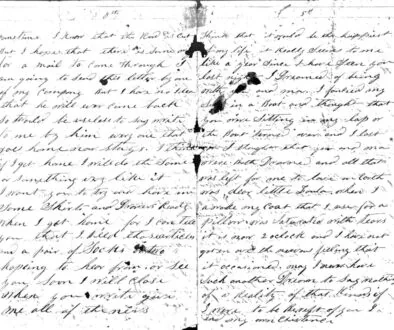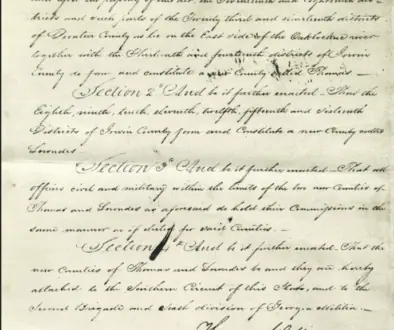“Another bad day”: The Diary of Henrietta Eugenia Vickers Armstrong (Part 1)
What must it have been like to live in Thomasville at the brink of the Civil War? Here at the History Center we have the transcript of a diary written by a young, seventeen-year-old woman over the year of 1861. This diary not only gives us insight into this question but also paints a vivid picture of life in South Georgia and how it was about to drastically change. Follow along as we explore the world from Henrietta Armstrong’s point of view in this blog series!
_____________________________________________________________________________________
Last time we heard from Henrietta, she had just learned of the State of Georgia’s secession from the United States of America. She was excited about this news in January of 1861. Will her feelings change along the way? In the meantime, how does she spend her days as a lady of leisure? Let’s find out.
When we last left off, Henrietta was home in Albany, but she and her husband, Aeneas, were planning to travel to her brother’s home near Lake Iamonia. Pleasant Nixon Vickers (1838-1873), otherwise known as “Buddie,” owned a plantation along the South Georgia border with Florida. Buddie’s wife, Annie, had recently given birth to their first child, a little girl who would later be named after Henrietta.
“This is the First day of February and it has been windy and rainy. Aeneas and Buddy went off this morning on a collecting tour and will be gone I expect four or five days. We have been working in the parlor all day. Annie wanted to have her room scoured and cleaned up generally. Ma and I helped to finish Annie’s delaine dress and I have been sewing on a dress for the babie [sic]. I have had a bad Headache all day. After supper I hurt my finger badly, not withstanding, I played Whist with Annie against Ma and Mr. Gunn. The wind blows hard.” (Friday Feb. 1, 1861)
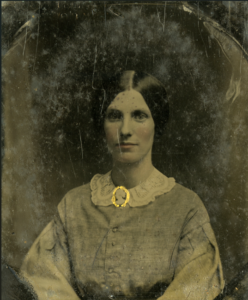
The men of the family are said to be on a “collecting tour” but the “what” being collected is never specified. It may have been money from borrowers or renters who lived in the area or even taxes. Meanwhile, the women stayed behind to help Annie by making clothing (the delaine dress mentioned is a type of wool and cotton fabric blend used for day dresses like the one pictured in Figure 1) and entertaining (Whist was a popular card game). Interestingly, Henrietta mentions Annie having her room scoured. Most likely the enslaved maids on the plantation would do a deep clean of the room, taking out all the linens to be washed and scrubbing down the floors and furniture. As anyone who has brought home a newborn can tell you, Annie’s room was probably pretty messy.
If this sounds like a pretty dull start to this journal, you aren’t wrong for thinking so. Like many women of her time, social status, and location, Henrietta spent a lot of time doing chores in the daytime and finding ways to pass the night until morning came around again. Her biggest excitement came two weeks later.
“It was raining this morning but cleared up about twelve. Aeneas wrote to Mr. Folsom ordering a sewing machine and Buddie sent him the letter by Elias. We received an answer in the afternoon from Mrs. Folsom saying that he would be here with one to morrow [sic] or next day. Buddie and Aeneas went fishing this evening and caught over thirty of the finest speckled perch that I ever saw.” (Thursday Feb. 14, 1861)
A sewing machine may not sound like a romantic Valentine’s gift for some, but for (accident prone) Henrietta, it meant her sewing projects moved at lighting speed (unbeknownst to her, this would come in handy over the next few months as her friends and neighbors joined the Confederate Army and needed uniforms). As for her Valentines Day meal of perch that she was so excited about, that would all change by February 20th when she wrote, “I am perfectly sick and tired of fish.” And just as fish and house guests tend to smell after a few days, the whole family made an exciting trip to Thomasville!
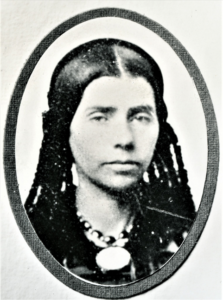
When the Vickers and Armstrongs visited Thomasville, they stayed with relatives. Henrietta was connected to the Seward family of Thomasville through her father’s first marriage to the mother of Frances Amanda Tooke Seward (Figure 2). Frances was married to James Lindsey Seward, who had served in both the Georgia and United States Houses of Representatives. Henrietta doesn’t go into detail about her stay with the family at this time, but she does talk about visiting friends and the fun she could have in town.
“We left Buddie’s this morning. The day is very pleasant though cloudy. Buddie came to town with us and will not go home until tomorrow. We all stopped at Mrs. [Frances] Seward’s. After dinner we went to town and I bought several articles then went round to see Lena Seixas, but did not find her at home. I called in at Mrs. H. Seward’s [Mary Harvey Seward, sister-in-law of Frances and James] and saw several of my old friends. I received a note from Lena tonight. We have put off leaving until tomorrow night.” (Tuesday Feb. 26, 1861)
Lena Seixas was the daughter of Edward Seixas (Figure 3), a Thomasville pharmacist and Huldah Smith, a member of the Smith family that gave Thomasville the land for Paradise Park. The Seixas family were some of the earliest settlers of the town. However, just a few months prior in September of 1860, Lena’s brother was mortally wounded in a duel. This meeting may have been the first time Henrietta would have seen Lena following the incident. So how was the family doing? Henrietta met them the next day:
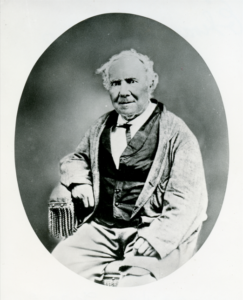
“Another pretty, but rather cloudy day. I went over to see Lena this morning. They were all glad to see me. I promised Lena to go to the Daguerreian Room this afternoon… Lena and I had our tintypes taken this afternoon, she gave hers to me. We left Thomasville on the stage [coach] at eleven o’clock to-night… There are a very few passengers in the stage.” (Wednesday Feb. 27, 1861)
Henrietta refers to a “Daguerreian Room” or what we would call a photography studio. At the time of this diary entry there were two studios in town: Remington’s Photographic Gallery was likely in the area that is now the Plaza and Professor Jeffers’s studio, later named the Sky Light Gallery and located on the second floor of a building downtown. Henrietta doesn’t specify which gallery they went to, but she does mention the only way to travel out of Thomasville at the time: stage coach, the 1800s precursor to a Grey Hound bus.
If February was a dull month, March quickly picked up the pace. March 4, 1861 marked Abraham Lincoln’s inauguration as President of the United States. Meanwhile, Henrietta and Aeneas made a detour to see his family in Macon before heading home to the Albany area. Just as soon as they got home, Aeneas was ordered to join a the CSS Savannah, a former steamboat called Everglade before it was converted into a gun boat for coastal defense.
“… I received a letter from Aeneas this afternoon. He is in Savannah and has been ordered to join the War Steamer, “Savannah,” formerly the “Everglade” a passenger steam boat. I do not know when I will see him, not very soon…” (Wednesday Mar. 6, 1861)
Seventeen-year-old Henrietta was left with a choice: stay home and tend to the plantation in her husband’s absence or go stay with her aunt in Eatonton, Georgia. Henrietta chose her aunt. She followed up with more news the next day: “Fort Sumter, it is expected, will be evacuated very soon, but the Yankees are so tricky that we cannot tell anything about it.” As quiet as Eatonton was, the rest of the country was heating up, and within a month, the first shots at Fort Sumter would signal the official start of the Civil War.
After three weeks in Eatonton, Henrietta went to her mother-in-law’s home in Macon to keep house while the rest of the family traveled to Florida for business and health reasons.
“Mrs. Armstrong is better this morning and has determined to go to Fernandina with Mr. Villepigue [Frederick L. Villepigue, Aeneas’s sister’s husband and Secretary of State for Florida from 1853-1863]. I will remain here and keep house until she returns. I did not hear from Aeneas today. I have remained in the house all day. I shall be very lonesome by myself, but I am fast learning to expect nothing and to bear misfortune as quietly and phlegmatically as possible. Mr. Villepigue makes himself very pleasant. I have nothing of importance to write in my Journal tonight, so I will put it up and let it alone. For to-night.” (Tuesday Mar. 26, 1861)
A few days later, Henrietta would have more of importance to record:
“…From accounts in the papers we may hope for a peaceful settlement to the difficulties between the North and South. But Lincoln and his cabinet are so tricky we cannot rely on anything they say. I will not be surprised if we have War and if we do there will be more blood shed than has ever been known. God grant that it may be otherwise.” (Thursday Mar. 28, 1861)
As the month continued, thousands of Federal troops arrived in Macon on their way to Pensacola, Florida to be shipped home. Henrietta had no idea how prophetic her words would prove to be over the upcoming months and years as the Civil War swept through our area and the nation. Tune in next time to see how Henrietta adapts to her newly changing world on the brink of the American Civil War!

